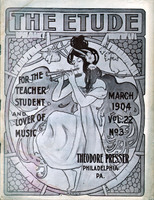It is a good thing to encourage pupils to become familiar with certain compositions, and to assign to the themes of such pieces definite qualities. We quote the following from the Musical Standard as bearing on the subject. Whoever plays the theme mentioned below cannot fail to be impressed with its clear, distinct character. It remains in the memory.
"A theme that is a perpetual pleasure to me is in the finale of Beethoven's pianoforte Sonata No. 5. It begins in measure 17, after that sustained chord. This nine bars of jollity must have delighted its composer even more than it does us. The simplicity of its structure is in keeping with its appropriate harmonies. Its effect on the ear is heightened by the paused chord that precedes it, but even apart from any poetic effect that it derives from its surroundings, it remains a typical theme of its originator.
"When playing it, I am constrained sometimes to express it 'forte' instead of 'piano' as it is marked. I am aware that such liberty with a master work is supposed to be repellent to the ghost of its creator, but it is surprising how this motive, played to my own satisfaction, embraves me to meet the displeasure of any number of ghosts.
"I presume the music is there for my pleasure, and I am sure the composer himself would gladly let me play this motive forte, if thereby I derive my pleasure.
"It seems to breathe the spirit of independence and contentment. We can account for its rugged independence by looking at Beethoven's beloved face, but for the contentment? It was the possibilities of life and love that impressed him, he never enjoyed them, but he craved for them. His craving is written in his music.
"This suggestiveness that is invariably the greatest virtue of good music is present in Beethoven's work to a remarkable degree—Bach alone seemed to realize feeling more than any composer. I fancy that suggestiveness is all we shall ever find in modern music, it certainly is all we need; but what we do find requires looking for industriously; how to adapt it to our need and existence is quite a personal matter.
"The student would do well to copy out that motive from Sonata No. 5, and frame it for his wall, where he shall see it o' days; he will probably derive more encouragement from this than from all the pictures he possesses. (But he should mark it piano, as it is written; his teacher would never forgive him marking it forte! But the student may remember this haunting theme forte, if he care to.)"



